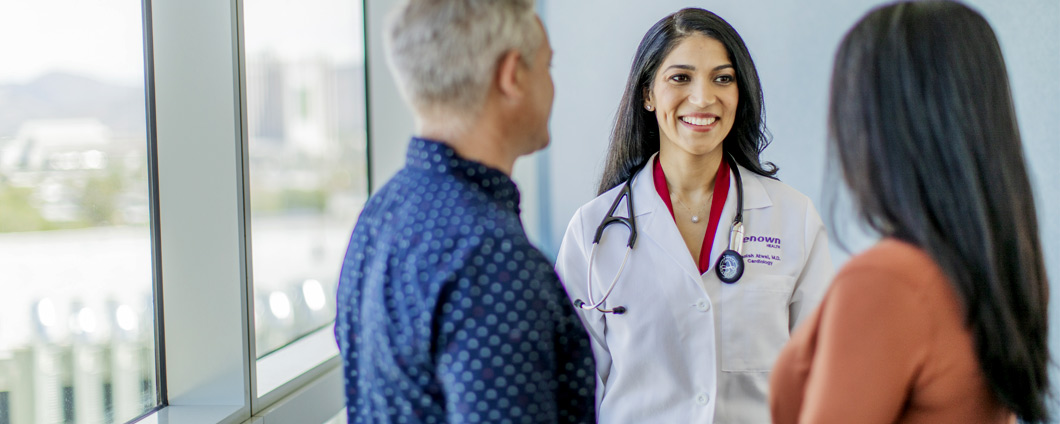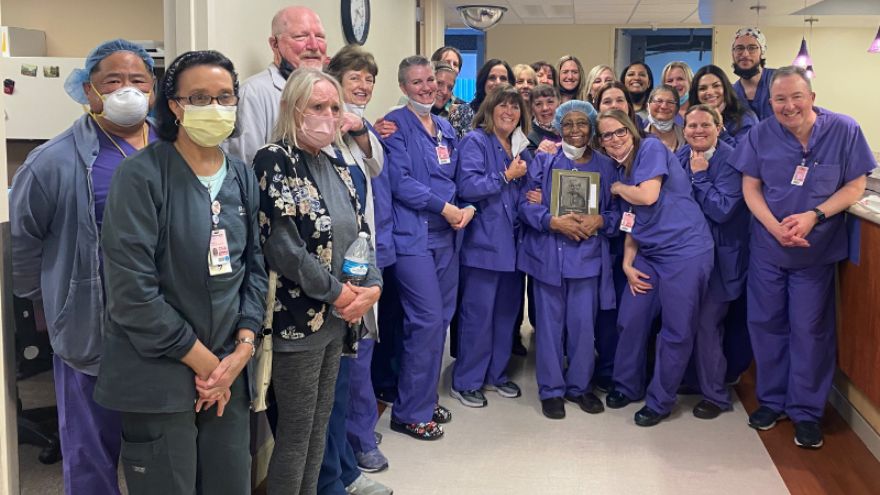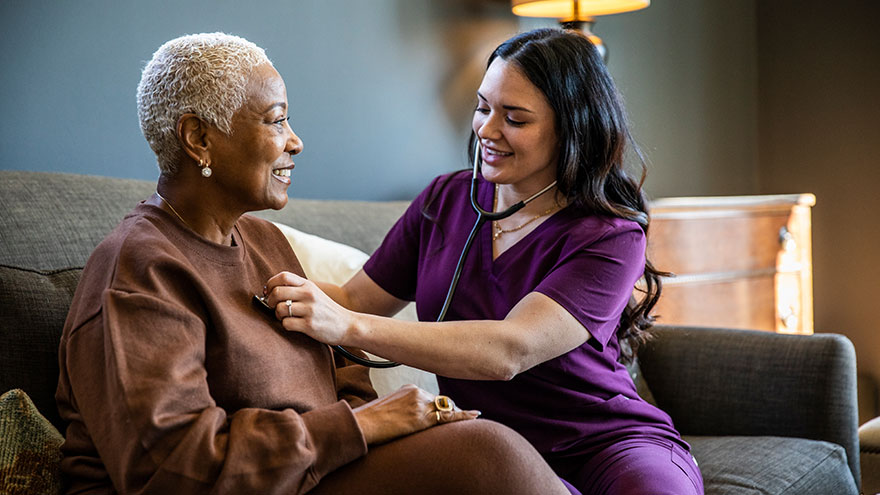Buscar
-
Saving More Lives; Renown Expands Breast Cancer Care, Adding Two Best-In-Class Breast Surgeons
Renown Medical Group is thrilled to welcome two distinguished breast surgical oncologists, Colleen O'Kelly-Priddy, MD and Michelle K. Chu, MD to the team. These highly skilled breast surgeons will solely focus on providing breast care and therefore play a pivotal role in Renown Health’s William N. Pennington Cancer Institute’s commitment to provide subspecialized care to the people living in our community and beyond. Dr. Colleen O'Kelly-Priddy is a fellowship-trained, board-certified breast surgical oncologist with an impressive background in breast cancer surgery. Dr. Priddy was born at Washoe Medical Center (which later became Renown Regional Medical Center) and grew up in Susanville, CA before attending Stanford University for her undergraduate studies. She is a graduate of the University of Nevada, Reno School of Medicine. "I am thrilled to return to Reno to help increase access to world-class surgical breast cancer care,” said Dr. Priddy. “My focus is to provide exceptional care, particularly for young people with breast cancer. I am excited to continue my mission here in northern Nevada." Dr. Michelle K. Chu, a board-certified general surgeon, brings her extensive experience in advanced breast cancer treatment to the Renown team. Dr. Chu received her undergraduate degree from the University of Pennsylvania and her medical degree from Western Reserve School of Medicine in Cleveland, OH. Dr. Chu specializes in oncoplastic breast conserving surgery and nipple sparing mastectomies. "I believe in tailoring treatment options to each patient's unique needs,” Dr. Chu said. “Whether it's preserving the natural shape of the breast or supporting the 'Going Flat' movement, our team strives to provide the best possible outcome for every patient." The newest addition to the William N. Pennington Cancer Institute, Renown Breast Surgery Care provides comprehensive breast surgery care at 1500 E. 2nd Street in Reno, adjacent to the Renown Regional Medical Center campus. "Breast cancer accounts for approximately 20% of newly diagnosed cancer cases in Washoe County, with roughly 520 new cases annually, establishing it as the most prevalent cancer type within our community,” says Brian Erling, MD, MBA, President & CEO, Renown Health. “We are proud, as the community’s largest not-for-profit healthcare system, to invest in cancer prevention and early diagnoses, including mammography screening and genetic research. For those diagnosed with breast cancer, Renown now offers two superb breast surgeons specializing in breast preservation surgery, and a breast surgery center providing comprehensive, compassionate care. Our goal is to save women’s lives, save families and ensure better care and better outcomes. This is a major step forward for women’s healthcare and our community.” As part of this expansion, Renown is assuming operations of Reno Surgical Advocates, a respected private practice in Reno. "Access to expert breast cancer care close to home is crucial, and our dedicated team at Renown Breast Surgery Care will work tirelessly to provide the highest level of care to patients while working closely with our other cancer specialists," said Max Coppes, MD, PhD, MBA, Director, William N. Pennington Institute for Cancer. “With the exceptional expertise of Dr. Colleen O'Kelly-Priddy and Dr. Michelle K. Chu, coupled with our state-of-the-art facility; Renown Health is a true partner in the fight against breast cancer in northern Nevada.” "People are increasingly relocating to northern Nevada, and in fact, Washoe County experienced a 2.1% population growth from April 2020 to July 2022. Consequently, although northern Nevada does not exhibit an above-average cancer rate, we are observing a rise in cases at our facilities," said Dr. Lee Schwartzberg, MD, FACP, Section Chief of Medical Oncology at the William N. Pennington Cancer Institute. "Renown Health is positioned to meet this growing demand, and we take pride in consistently adding nationally renowned healthcare providers to our team to save the lives of women in northern Nevada. About Renown Health Renown Health is the region’s largest, locally governed, not-for-profit integrated healthcare network serving Nevada, Lake Tahoe, and northeast California. With a diverse workforce of more than 7,000 employees, Renown has fostered a longstanding culture of excellence, determination, and innovation. La organización se compone de un centro de urgencias, dos hospitales de cuidados agudos, un hospital infantil, un hospital de rehabilitación, un grupo médico y una red de atención de urgencias y Hometown Health, la compañía de seguros sin fines de lucro más grande de la región y de propiedad local, Hometown Health.
-
Women's Heart Center
Heart disease is the leading cause of death in women. According to the American Heart Association, heart disease kills more women than all forms of cancer combined and yet only 44% of women recognize that cardiovascular disease is their greatest health threat. Recognizing the urgent need for women's cardiac care, Renown Health established the Helaine Greenberg Women's Heart Center, the first of its kind in Nevada.
-
Women and Stroke Surprising Signs to Know
Stroke is unfortunately common, with 1 in 5 American women experiencing it each year. When it comes to a stroke the phrase “time is brain” speaks to the urgency of getting rapid care. In fact, a woman may lose nearly 2 million neurons per minute of oxygen loss to the brain. The Renown Health Comprehensive Stroke Center experts share the importance of timely treatment and how stroke symptoms can differ in women. Women and Stroke – Surprising Symptoms Each year stroke affects more women than men. Even more concerning, women are less likely to recover from a stroke. The following non-traditional, less common, warning signs can be common in women: Hiccups with chest pain Sudden disorientation, drowsiness, confusion or a general altered mental status Nausea or vomiting A sudden headache that feels like the ‘worst headache of your life’ Unusual chest pain (especially with hiccups) Body numbness or weakness, such as an arm or leg suddenly ‘falling asleep’ Fainting or loss of consciousness Stroke Diagnosis The first step is neuroimaging by CT scan. This allows for rapid identification of any bleed, and also assists in determining candidacy for the early clot busting medication. MRI brain imaging is much higher resolution, and can better determine the core stroke size, assisting in prognosis and recovery. Since strokes have several different origins, an inpatient workup is essential to determine the underlying cause. Whether the stroke is secondary to plaque in the large vessels, clots being thrown in the setting of atrial fibrillation (an abnormal heart rhythm), or small vessel disease from years of uncontrolled vascular risk factors (high blood pressure, smoking, high cholesterol, diabetes), determining the cause is essential to implementing a management plan to reduce risk for further strokes. Quick Treatment for Stroke is Key Early recognition of stroke symptoms and seeking prompt attention is paramount. There are interventions that can be instituted to minimize the stroke and increase likelihood of recovery, but only if a patient presents to the hospital early. A clot busting medication, called tPA, can be given to patients with stroke if given within 4-5 hours from time of onset. Renown Regional Health Center is designated as a Comprehensive Stroke Center, the highest level of stroke certification available. To earn the designation of comprehensive stroke center, a hospital has to meet stringent requirements, including biannual on-site evaluations. This includes care for ischemic stroke patients (lack of blood flow), hemorrhagic stroke patients (bleeds), and determining the underlying cause to guide secondary stroke management prevention. Stroke Symptoms Remember “B.E.F.A.S.T.” to recognize the symptoms of a stroke below: B – Balance Being off balance or dizzy, is common. E – Eyes An eyesight change such as blurring or double vision may occur. F – Face droop One side of the face, or lip, droops A – Arm weakness Does one arm drift down? S – Speech Talking may slur or sound strange. T – Time Time to call 911. Call an ambulance immediately if you or anyone else, experiences any of these symptoms.
-
Tratamiento de control de la vejiga para mujeres: ¿cuál es la opción correcta para usted?
Although going to the bathroom is not a typical conversation among women and their doctors, it’s an important one. It is a topic you may want to discuss with a urogynecologist, a physician who diagnoses, manages and treats pelvic health conditions in women. Kerac Falk, MD, a urogynecologist and assistant professor at the University of Nevada, Reno and Renown Health discusses overactive bladder in women and how to treat it. According to the National Institutes of Health, about 1 in 4 women struggle with pelvic health conditions, with over 40 percent of women over age 60 experiencing problems. While these conditions may be common, they shouldn’t just be accepted as a normal part of getting older. In fact, many women don’t think of urine leakage as a medical problem, and only 1 in 3 women with incontinence seek care. So, while these conditions may be common, they shouldn’t just be accepted as a normal part of getting older. There are excellent treatment options that can significantly improve the quality of life. Overactive Bladder Symptoms in Women: As your body changes and ages, so does your pelvic health. Whether you just had a baby, are experiencing urgency issues or find you cannot go about your daily routine, sneeze or laugh without leaking urine – you’re not alone. An overactive bladder, also known as OAB, is more than feeling an urgent need to go to the bathroom. It can also include the following: Incontinence or lack of control over urination Waking up in the middle of the night to empty your bladder Going to the bathroom often, even every 30 to 60 minutes Symptoms of OAB can lead to a decreased quality of life, feeling as if you cannot go about your normal daily routine, or even become hazardous, increasing the risk of trips, falls, and bone fractures. Various Treatments are Available: Behavioral management (eliminating coffee, soda and alcohol which irritate your bladder) Pelvic floor physical therapy to optimize nerve and muscular function and coordination to prevent leakage Medications including tablets and local estrogen replacement Pelvic nerve stimulation and reprogramming treatments Botox to relax the bladder muscle Solutions for an Overactive Bladder: Simply put, OAB is a nerve and muscle problem, so the bladder needs to calm down. Although there is no underlying reason for OAB, some underlying conditions may exist, such as: High blood pressure Recent trauma Neurological conditions (such as stroke and multiple sclerosis) Lifestyle and non-invasive measures can usually reduce symptoms by as much as 50%, significantly improving quality of life. However, if these measures do not help your OAB, further bladder testing may be needed. Dr. Falk notes that “every patient has a unique situation and set of symptoms. My job as a urogynecologist and pelvic floor subspecialist is to work as a team with each individual to figure out what’s going on and design the best treatment approach that fits your needs and goals, whether that is conservative or with more advanced procedures. The outcome we are working towards is improved quality of life.” If you are bothered by your bladder, the best thing you can do is bring this up with your primary care doctor or gynecologist to begin to discuss solutions
Read More About Bladder Control Treatment for Women – What’s Right for You?
-
Why Your First Mammogram at 40 is a Vital Health Priority
A mammogram may not be on the top of your to-do list when you turn 40, but it needs to be. The American College of Obstetrics and Gynecology recommends a first mammogram at age 40, however you may need one earlier, so talk with your provider about your breast cancer risk. The purpose of a first time or baseline breast screening, is to get an accurate image of your breasts for future comparisons. Amber Snow, Supervisor of Renown Health Imaging, tells us why it’s important to get a baseline mammogram and what to expect during your visit. Mammogram Screenings Save Lives Simply put, a mammogram is a low-dose x-ray image of your breast from two views: top to bottom and side to side. A yearly screening reduces your risk of dying from breast cancer. Mammograms can detect signs of breast cancer even before you can see or feel it. That’s why it’s important to get a first- time mammogram. About 85% of breast cancers happen to those with no family history of it and in the U.S., one in eight women will develop breast cancer. Unfortunately, the two main risk factors for breast cancer: being female and aging. “Your baseline screening is important when you’re young, so that we know when changes occur,” explains Snow. “We compare your current mammogram to all your previous ones to know if anything changes year to year.” If you are under 40, talk to your provider about getting a formal risk assessment to see if a screening is right for you. If you have a family history of breast cancer a mammogram before age 40 or additional testing may be recommended for you. 3D Mammogram Technology Renown Health uses the latest 3D mammogram technology allowing our radiologists to see early changes in your breast tissue. This also reduces the number of false readings compared to traditional mammograms. While breast screening technology has improved, it is not uncommon to get called back after your first mammogram. According to the American Cancer Society, fewer than 10% of women called back for further testing have been found to have cancer. Reasons for being called back for further imaging include: Dense breast tissue, which can make it hard to see tumors A cyst, mass or unusual tissue is seen A possible area of concern needing another, closer look Preparing for Your Mammogram For an accurate image of your breasts do not wear deodorant, powders or lotions, as they can make it difficult to read your breast images. This is what will happen during your breast screening: A gown will be given to you and you will go to a private area to undress from the waist up, putting on the gown. You will then be escorted to the imaging room and a care team member will place one of your breasts between two plates. The plates will flatten to allow the most breast tissue to be seen and you will feel a firm pressure. You will be asked to hold your breath while the image is taken. An adjustment will be made to the plates to get a side view of the breast. The plate adjustments and images will be done on your other breast. Typically, a mammogram appointment is quick – only lasting about 15 minutes. Be Your Breast Friend While breast screenings are important, it’s also key that you know how your breasts normally look and feel. A monthly self-exam to check for lumps is essential, as breast cancers are often found during a routine self-exam. Remember your hormone levels change monthly, with your breast feeling tender and swollen right before your period. It’s best to perform a breast exam the week after your period after the swelling is gone. To avoid breast tenderness, this is also the best time for a mammogram.
Read More About Why Your First Mammogram at 40 is a Vital Health Priority
-
Take Charge of Your Sexual Health
Much like general physical and mental health, sexual health is an essential aspect of your overall well-being. Therefore, educating yourself on your sexual health is an important piece regarding your overall wellness. Secure & Private Virtual Visits Did you know that many sexually transmitted disease appointments can happen virtually, in the privacy of your own home? Our providers can perform a screening examination for sexually transmitted illness (without symptoms) when it’s convenient for you. This is a great option if the topic makes you uncomfortable during an in-person visit, or if you can’t find time to visit your primary care provider or local urgent care. After the telehealth appointment, your provider will determine the next steps for you. Remember, in-person visits are always an option as well. Here’s how you can take charge of your sexual health: Get Comfortable with Getting Tested Surprisingly, some people with STDs don't show symptoms, meaning they may not even know they have an STD unless they get tested. Even if an STD shows no symptoms, the result of non-treatment can be serious. Bret Michael Bellard, MD, with Renown Medical Group, shares that it’s important for people to get tested for STDs because if left untreated, they can cause the following health problems: Loss of fertility Pregnancy complications Other health issues When to Visit Your Primary Care Provider Who should get tested and how often? “The recommendations are that everyone from ages 13 to 64 should get tested at least once for HIV. All sexually active adults should also be tested for other STDs once a year, and all pregnant women should be tested at the start of their pregnancy,” says Dr. Bellard. Some STDs, like syphilis, can be passed from mother to baby, so it's important for women to get tested as soon as they know they’re pregnant. Dr. Bellard recommends going to your primary care provider for testing. “They can also give advice on prevention and other health topics.” If you don’t have a primary care provider, this is a great reason to get established with one. Women with an established OB/GYN can have STD testing done simultaneously with their annual pelvic exam. The providers in Renown's network care for patients of all ages and specialize in family medicine, internal medicine, pediatrics and OB/GYN. Practice Safe Sex STDs are preventable. Practicing safe sex and getting tested routinely are your best defenses against all types of STDs. For many, the conversation about sexually transmitted diseases is awkward and many avoid it. To lower your risk of contracting an STD, don’t wait until you’re “in the moment” to have the conversation with your partner about the last time you were both last tested. If you haven’t gotten tested in-between new partners, use latex condoms every time you have sex until you are both confirmed negative of STDs. Condoms are not 100% effective at preventing disease or pregnancy. However, they are extremely effective if used properly. To establish Primary Care, visit renown.org/virtualvisits or call 775-982-5000
-
Departamento destacado: Trabajo de parto y parto
Parents welcoming their new bundles of joy into the world might be overcome with emotions. They're exhausted yet excited to meet their new baby and hold them in their arms. That’s where Renown Health’s Labor & Delivery (L&D) department comes in. When patients arrive at the L&D unit in Renown Regional Medical Center, they are embraced with caring, compassionate nurses, surgical technicians and physicians ready to serve their family. As they get ready for the big moment in their private L&D room or family suite, you can be certain that you, they can be certain that they will receive the excellent care they deserve. Unpredictable, but Never Unprepared Ushering in new life can bring a lot of surprises for parents, but the L&D department is prepared for any challenge. Whether the unit is helping with a routine or high-risk delivery, every patient and newborn are treated with personalized care that is uniquely tailored to their own individual needs and birth preferences, from labor evaluation and birth to post-birth lactation consultation and navigating the nursery. “Our floor is never predictable,” said Bri Goode, Renown L&D nurse. “Our nurses and our staff work as a team to ensure the best care for our patients. I commonly say that we are all 'nurses’ for each patient!” The state-of-the-art technology at their fingertips – including advanced 3D ultrasound machines – coupled with the love and passion the team has for their patients allows them to create an optimal environment for every mother and baby. The unit is also equipped with a Labor Assessment Area, where expectant mothers are evaluated to determine what stage of labor they are in, removing the guesswork and allowing providers to treat the patient and unborn child more efficiently and meet them exactly where they are at in the labor process. Nothing can replace the careful guidance and words of encouragement a patient needs in the delivery room. The L&D department are true patient advocates and firmly believe in the power of listening and the power of staying calm and collected. “To help our patients and ease their fears and anxieties, we always ensure them that our biggest goal is to have a healthy mom and healthy baby,” said Lindsay Strowmatt, Renown L&D nurse. “We constantly reinforce that they are strong and capable. Empowerment goes a long way!” “We always take the time to actually sit down and listen to the patient, no matter how busy we are,” added Krystie Mortensen, Renown L&D nurse and DAISY Award winner. “It’s important for us to understand where their nerves are stemming from and address any changes in plan of care along the way.” While the L&D unit is seen as a “happy place,” as described repeatedly by the members of the team, a seemingly low-risk patient can also turn into an emergency in a matter of seconds. "Our line of work can involve high-stakes emergency care,” said April Tucker, Renown L&D nurse. “We view change as a necessary part of growth, and we save lives.” These steps result in high patient outcome scores, which can be attributed directly to the unit. “We have continually great outcomes from hard work and consistency in care,” said Roya Galata, Renown L&D nurse and Nursing Organizations Alliance (NOA) Lifetime Achievement awardee. “I have tremendous love for my patients and the type of work I do.” Awards Without End With patient safety and experience always top of mind, and with the team continually going above and beyond for all parents and their newborns, it’s no wonder why the L&D department has achieved a long and growing list of both local and national awards and accolades. This year, U.S. News & World Report ranked the L&D unit at Renown Regional as "High Performing in Maternity Care – Uncomplicated Pregnancy.” This award is only the latest in this department’s “Best Of” accolades list, as the unit also achieved a win as the Best Place to Have a Baby in the 2022 Best of Reno Awards. Not only is the department continually recognized, but individual team members also receive coveted awards within their professional associations. As previously mentioned, Krystie Mortensen is a DAISY Award winner, which means that she has been recognized for the “super-human work” she has done throughout her career. Additionally, three team members, including Roya Galata, have received NOA awards, celebrating their contributions to the nursing profession as a whole. Many nurses in this department also choose to pursue lifelong learning by taking advantage of the educational benefits that Renown offers. Several team members have completed their continuing education in midwifery and advanced practice, reaffirming their dedication to delivering healthy babies and helping parents manage their first few days with their newborns. “The teamwork on this unit is phenomenal, and the energy and commitment that the staff comes in with every single day amazes me,” said Lora Carlson, Renown L&D Manager of Nursing. Internally, the L&D department loves to show their spirit at Renown. In December, they received the Best Holiday Decoration award during the 2021 holiday season. The team also enjoys participating (and scoring well) in Renown-sponsored Halloween costume contests. In 2023, the L&D department will only pursue greater heights to continue producing patient outcomes. A Work Family “I stay here because this is my family. My work family.” These strong words were proudly stated by Jeanne Bufkin, Renown L&D Surgical Technician, and echoed by virtually every L&D employee. Having each other’s backs during both times of need and times of celebration is a must in this department, and they do so proudly. “Our staff constantly back each other up,” added Lora Carlson. “They display a lot of adaptability and flexibility. That’s why our unit functions as well as it does.” Several team members in this department experienced the care of the L&D unit at Renown before they became fully-fledged employees. “I had two of my babies here and had wonderful experiences both times,” said Judy McBride, Unit Clerk. “I love being a part of the reason why the next woman can say the same!” Bri Goode also delivered her child at Renown and loved her experience so much that she was also inspired to join the team. “I chose to work at Renown because when I had such a positive experience during my delivery while I was in nursing school, I knew it was a team I wanted to be a part of.” Coming to Renown was clearly an easy decision for this team; staying at Renown is even easier. “I stay here because I love what I do and who I do it with,” said Judy McBride. “I truly feel like I am treated as an asset to this department, and it makes me want to come to work every day and make a difference in these mothers’ lives.” The closeness of this department and the top-of-the-line collaboration displayed by every provider can be felt by the patients during their entire stay at Renown. “We have an amazing collaborative team of physicians, nurses, scrub techs, unit clerks, patient access representatives and environmental services personnel that strive to provide our patients with the best possible care,” said April Tucker. The labor and delivery process is a team effort – and those interested in jumping in on this team effort are welcome to join. Delivering healthy babies and supporting new mothers are cornerstone acts in meeting Renown’s mission of making a genuine difference in the communities we serve. Our L&D department does precisely this and more, never giving up in Fighting the Good Fight.
-
Las mujeres y los ataques cardíacos: signos sutiles que debe conocer
Heart disease is the number one killer of women – claiming one life every minute – yet many women don’t know that the signs of heart attack may not be the same symptoms they’ve learned about all their lives. In women, nearly 71% experienced unusual exhaustion in the weeks before, 50% had trouble sleeping and 42% suffered shortness of breath. Most importantly, about 43% had no chest pain. Women and Heart Attacks: The Subtle Symptoms In both men and women, the most common symptom is pressure or pain in the mid chest, but there are also more subtle signs. “Women can experience a heart attack without chest pain,” explains Letitia Anderson, M.D., cardiologist with Renown Institute for Heart & Vascular Health. “It is not uncommon for women to experience extreme fatigue, shortness of breath, dizziness, lightheadedness, nausea, vomiting and pain in the abdomen or back as their primary symptom.” Other symptoms can include: Neck or jaw pain Fullness or pressure that goes away and comes back The feeling of a rope being tied around your body and squeezed Some doctors have reported seeing patients who just didn’t "feel right." One woman simply felt more tired than usual while cleaning, while another woman reported feeling winded carrying boxes to the basement. Admittedly these are symptoms many of us would shrug or sleep off versus going to the hospital for immediate care, which is why it’s important to pay close attention to the warning signs. “Women are good at being the caregiver for the rest of the family and writing off their own symptoms as something minor, like indigestion or a muscle pull,” says Dr. Anderson. “Remember that heart attacks have early warning signs, and if they are recognized and treated in time, a heart attack can be prevented and heart damage avoided.” When You Need to Call 911 Paying attention to your body is key. If you’ve experienced any unusual or flu-like symptoms, struggled to breathe or just don’t feel right – give yourself a gut check and ask if you’ve honestly felt this way before. If you’re worried at all, you need to seek emergency care. Do not wait – call 911 immediately Take an ambulance to the hospital if at all possible Try to stay calm and take deep, slow breaths until medical help arrives.
Read More About Women and Heart Attacks: Subtle Signs to Know
-
Remove the Guesswork with Renown’s Labor Assessment Area
Pictured above: A section of Renown’s Labor Assessment Area. When patients expecting a new child are about to give birth, nerves can be especially heightened. Questions flood their minds: Is the baby actually on the way? What’s going to happen next? Are we ready to push? Lucky for them, at Renown Health, the guesswork can finally end with Renown’s Labor & Delivery unit Labor Assessment Area. This unique space is a triage area that helps make more precise labor diagnoses by determining exactly what stage expectant parents are at in the labor process. Funded by a state grant more than a decade ago, the six-bed Labor Assessment Area sees 500-600 patients per month – from patients entering the unit directly, unsure if they are in active labor, to patients who are sent over from elsewhere experiencing labor symptoms, such as high blood pressure and water breaking. The area also serves as a pre-operation space for patients getting ready for procedures such as C-sections. The six cubicles that are enclosed with doors and curtains ensure each patient gets the private, one-on-one care they need. Furthermore, rather than sitting in a waiting room, this area allows expectant parents a comfortable place to prepare for labor. “We are a unit that prides ourselves on getting patients into beds very quickly,” said Debbie Hawley, Associate Nurse Manager in Renown’s Labor & Delivery unit. “This area has allowed us to triage more effectively and allow more patients to collaborate with their provider in a quick manner.”
Read More About Remove the Guesswork with Renown’s Labor Assessment Area
-
5 Things to Know About Women’s Heart Disease
Heart disease is more common in women than many people think. In fact, it is the leading cause of death in the United States, ahead of cancer and stroke. However, the common signs and symptoms we often associate with men and heart disease don’t always align with women. Thankfully, Renown Health is home to the first women’s heart center in Nevada. The Helaine Greenberg Women’s Heart Center gives women in our community the opportunity to receive exemplary care and education. “At the Women’s Heart Center, we are proud to offer the women of our community the treatments, therapies and education they need to fight this silent killer,” Dr. Danish Atwal. 1. The warning signs for heart disease present differently in women than they do in men. Both men and women may experience chest pain during a heart attack, but the similarity of symptoms ends there. Heart disease is especially problematic for women because more than half of women who die of heart disease have no symptoms at all. Women tend to have subtler symptoms that mimic symptoms associated with common, mild illnesses: Fatigue or weakness Pain, pressure or tightness in the center of the chest Pain that spreads to the upper body, neck or jaw Sweating, nausea or vomiting Sudden dizziness Shortness of breath Trouble sleeping 2. Women are often not treated with the same medications as men, even when they should be. Women are less likely to receive heart medication because their disease is often misdiagnosed or because they do not seek proper care. According to a study done by Harvard Health Publishing in 2020, “A general lack of awareness of women’s heart disease may lead to doctors or patients missing heart attacks in women or delaying their diagnosis. For example, while the frequency of cardiovascular disease tends to be lower in women before menopause than in men, the frequency dramatically increases after menopause, when it accounts for approximately one out of every three deaths in women. 3. Women who have hypertension, high cholesterol, type 2 diabetes or gestational diabetes during pregnancy are at a higher risk of a heart attack in the future. Women who experienced complications related to developing high blood pressure or hypertension during pregnancy had a 63% increased risk for developing cardiovascular disease later in life, as stated by research funded by the National Heart, Lung, and Blood Institute. According to that same study, researchers found that early screenings and monitoring in four target areas – blood pressure, cholesterol levels, glucose levels and body mass index – could provide even more personalized targets to help delay or possibly prevent future cardiovascular events among women.
Read More About 5 Things to Know About Women’s Heart Disease
-
How to Get Vitamin D on Cloudy Days, and Every Day
Vitamin D, also known as the sunshine vitamin, is considered a pro-hormone and is synthesized by our bodies when skin is exposed to sunlight. It helps our bodies absorb calcium, build strong bones and teeth, can help ward off osteoporosis and can help reduce the risk of developing type 2 diabetes by 15%. However, getting the vitamin D you need isn’t quite as simple as soaking up the rays. Vitamin D breaks down quickly, and in the winter – especially in northern latitudes – the sun never gets high enough for UVB rays to penetrate the atmosphere and reach your skin. So how do you get enough vitamin D? We asked Alexandra Westover, APRN for Renown Health, for more information on the topic. "Vitamin D deficiency is found to be linked to multiple health concerns; everything from cancer to depression," says Alexandra. “That said, rates of vitamin D deficiency are high in the U.S. due to various reasons, with the increasing rates of obesity being one factor." Another factor explaining why most Americans are low in vitamin D is that we get very little of our vitamin D from our diet, with most of our vitamin D being produced via exposure to sunlight. However, lounging in the sun for long hours without sunblock isn’t recommend either due to risk for skin cancer, thus, a supplement might not be a bad idea if your doctor is okay with it. "If your vitamin D levels are low, eating high vitamin D foods, such as fatty fish, mushrooms, dairy, eggs and fortified cereals and orange juice, can help, but it typically isn’t enough to correct a deficiency, nor are over-the-counter vitamin D supplements,” said Alexandra. “Most people require a prescription-dose level of vitamin D to correct deficiency." Top 5 Reasons Why You Need Vitamin D Maintains healthy bones and teeth Supports the health of the immune system, brain, and nervous system Regulates insulin levels and aids diabetes management Supports lung function and cardiovascular health Influences the expression of genes involved in cancer development Eating Foods That Are Rich in Vitamin D Fatty fish such as salmon, herring and tuna Fortified milk and orange juice Fortified cereals Eggs Mushrooms Cod Liver Oil
Read More About How to Get Vitamin D on Cloudy Days, and Every Day
-
Get Ready for Baby with Childbirth Classes
By taking our pregnancy and birth class, you will gain the tools necessary to have a safe and empowering birth experience for both you and your baby. Chris Marlo, Childbirth Educator at Renown Health explains why birth classes are important. For questions regarding classes or tours, contact Chris Marlo: chris.marlo@renown.org 775-982-4352 What is a Certified Childbirth Educator/Doula? If you are expecting a baby, Renown has a wide variety of classes to help prepare you for birth. Classes are taught by certified childbirth educators and doulas. A certified childbirth educator is a trusted resource who has a passion for educating expecting parents about childbirth, and will provide you with non-biased, evidence-based information. A doula is a professional labor assistant who provides physical and emotional support during pregnancy, childbirth and postpartum. As you prepare for birth, our certified educators will guide you each step of the way and ensure you receive the quality care you deserve.










